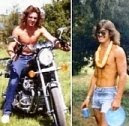 Doing something beneficial and
fruitful is one thing; doing something you enjoy is another thing. If the two
meet and mix and meld, you are lucky. So spaketh Fram Original ....
Doing something beneficial and
fruitful is one thing; doing something you enjoy is another thing. If the two
meet and mix and meld, you are lucky. So spaketh Fram Original ....Some of my recent hours have
been utilized going through / reshuffling / dusting books, with periodical
moments spent opening a few and thinking about when and why I obtained them.
Three of them are shown here. All three have met the criteria mentioned, but
two are on their way to early obsolescence because of the internet. The third
might be, as well, but, for me and an at least a few undefinable others, Ernest
Hemingway will never be relegated to the internet.
The first video features the
KamiBand, among other things the backing band for BabyMetal, performing an
instrumental piece. Each member portrays a "god (Kami) of music." The
guitar man on the left is Mikio Fujioka, who died January 5, 2018, from
injuries sustained in a fall from an observation tower. He was 36. The second
video is 43-plus minutes of songs from Zard, a Japanese pop rock band, during a
memorial concert for Izumi Sakai, who died on May 27, 2007, at the age of 40.
Cancer caught her. In many ways, she was Zard.
Here
today .... gone tomorrow
During
my life I have had a propensity for overindulging in what I consider to be the
necessities of life: Books, firearms, coins, liquor and smokes.
Unlike
many, I neither smoked much nor drank alcoholic beverages to any degree as a
boy or a teenager. The only cigarettes came when one of the "crew" liberated a
parental pack and we sat around in an isolated location and smoked until they
were gone. I often say I can count the number of beers I consumed during my
school years on my fingers, and the same was pretty much true for the "hard
stuff."
With
coins, I have a taste for the bright and the shiny, which translates into silver or
gold. With firearms, I am deadly with a handgun or a rifle and less than
average with a shotgun, so you can figure for yourself which I prefer. I have
bought and sold and traded since I was a teen, but never owned more than 60 at
a single time. Owning means care and cleaning, whether one is shooting them or
not. I assume you get my drift there.
Books
have come in all shapes/sizes/genres. In recent years, my focus has been on the
"Plains Indian Wars," which ran from roughly 1850 through 1890. My interest has
been great enough to devote six weeks on a "tour" of frontier forts and
battlefields which ranged from Minnesota to Montana then south to Texas and
back again. I also have participated in two archaeological surveys as an
amateur volunteer -- one of which meant walking and hands and knees crawling long
days in and around Fort Phil Kearny in Wyoming.
Many
of the nonfiction and fiction books I have been reading center on that era, as
well as the transmigration of settlers from Europe to North America. I am
constantly suggesting people read writers like Frederic Manfred and Mari Sandoz
and Ole Rolvaag and Hamlin Garland and ....
I
periodically purge my collection of books, with the largest being 150. By
purge, I mean give them to libraries. There have been occasions when librarians
have said, "Sorry, not interested." Those words always shock me, but, I do
understand that, like individuals, institutions occasionally must purge their
holdings. One of my "sneakier" techniques is simply to "dump" a dozen books
into a library's return chute.
One
of my "chores" the past few days has been to sort through and rearrange a few
bookshelves. Two of my more interesting finds have been these: "Exploring Literary
America," a 1979 book by Marcella Thum, and "The Dictionary of Cliches," a 1985
offering by James Rogers. The former book offers a few pages of biographical
material on 70 writers and the latter is data on more than "2,000 common or
amusing clichés -- their meanings and origins."
Both
books have been useful to me at times, but cannot "hold a candle" to the near-instantaneous
internet these days.
Moving
sideways a few steps, my ability to curse for five or six minutes nonstop
without taking a breath I blame on or I credit to -- depending upon one's
viewpoint -- to the Marine Corps. I have my doubts the internet will make that "skill" obsolete ....
Semper whatever, baby ....
















